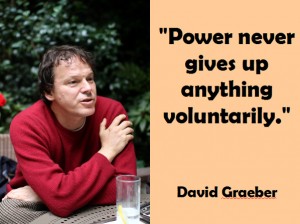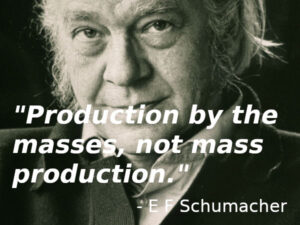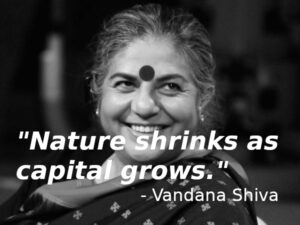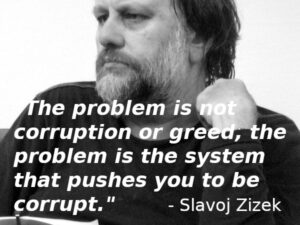What were your ‘light bulb moments’ in understanding the way the world works? Here are mine

Here’s a rash statement, but I believe it to be true. Most people these days know, either rationally or intuitively, that humanity is heading in the wrong direction. If you ask people whether we’ve seen the back of ecological calamaties, financial collapses, corruption, poverty or war, most people, I think, would say that ‘we ain’t seen nothing yet’. I haven’t done the market research, but it’s the feeling I get from all kinds of people I talk to.
If you’re reading this, you almost definitely don’t think that we’re headed in the right direction. But what were your wake-up calls – your ‘light bulb moments’? Here are some of mine. They’re ideas that are not mainstream, but once you get them, you can’t un-get them, and they now colour the way I see everything.
- There’s something wrong. For me, this realisation came as a child, and it came via an environmental route (I was a nature boy, fixated on the creepy crawlies in our garden from a very early age) and it was delivered by David Attenborough. I loved his nature documentaries, his breathless delivery and his obvious enthusiasm. But every programme seemed to end the same way – by informing viewers that the animals we’d been watching are endangered, for some reason, and they were on the slippery slope to extinction. I was only a boy, but I knew something was seriously wrong. Why were so many other species in trouble? It was clear that the problem was human activity. Our booming population, our over-extraction and our removal of habitat wasn’t allowing room for other species, which were either becoming extinct, living in small, threatened pockets, or surviving in captivity only. At the time I was saddened by this, for the sake of the animals themselves. It wasn’t until much later that I understood how dangerous damaging nature is going to be for humans (see below).
- There’s no food shortage. One evening as a young man, I was about to go out with friends, but sat down to watch a documentary about the famine in Ethiopia first. I ended up staying in, in turmoil. I knew it was happening, but I hadn’t really looked into it before. I was young, and mainly interested in having fun. But footage of mothers watching their children die, knowing that they’d be next, grabbed my attention. Why didn’t the probably-overfed cameraman give her some food? Why didn’t the Ethiopian government do something? It was all to do with the weather, right? Wrong. I was stirred to do some background reading, and my real light-bulb moment was when I discovered that Ethiopia was exporting food all through the famine. How could the Ethiopian government be so cruel? Well, it wasn’t their fault of course. All the best land was owned by Western corporations, who were exporting luxury foods like tinned pineapples and coffee to the West. It wasn’t their concern that ordinary Ethiopians didn’t have access to land. They weren’t breaking any law, and they had to maximise returns for shareholders or lose market share. At the time, most people didn’t understand this, and they fell for the ‘solution’ offered by the corporate sector – more corporate-controlled technology (e.g. GM) to increase food production. But there is no food shortage. Every continent is producing more than enough food. See here. Plus in the West, obesity is a growing problem and around one third of all food produced is wasted.
- Governments are not in control. At first, like most people, my approach was that these problems could only be solved by governments doing something. My light bulb moment was that actually, that’s not where real power is, and it came when I understood how the corporate sector controls governments. First, with the raw power of money: in the US alone, around $7billion is spent on a round of federal elections. Corporations aren’t actually allowed to fund politicians directly, but they get round it via Political Action Committees (PACs) and super-PACs. They don’t do this for fun, they do it for control, and no-one else can compete with that sort of money. Second, lobbying, which costs corporations over $3billion per year in the US alone. There are ten times as many lobbyists in Washington than politicians. A lobbyist’s job is to try to persuade politicians to do what their corporate employers want. Third, the ‘revolving door‘ – giving jobs to politicians when they leave office, or even whilst in office. Often, these politicians will be involved in creating legislation affecting the businesses that they work for. If a party gets elected in the West that is committed to challenging corporate power, they will be punished by the corporate sector, and investors will remove their money from their country, ensuring that they lose the next election to a pro-corporate party. This is happening now in Greece, and it would happen in any country electing an anti-corporate party. Governments can only change things very superficially, but we need much more, because…
- If we don’t change, we’ll become extinct. This came from reading Edward O. Wilson (the Diversity of Life) and Richard Leakey (the Sixth Extinction). Wilson took it further than Attenborough for me, and explained that not only were many species in danger, the whole of ecology was being so degraded that unless we stop, a ‘cascade point’ will be reached (because species are so interconnected), where so many species have been lost (or even if they still exist in zoos, lost to ecology) that a snowball effect removes more and more species so that ecology begins to haemorrhage, to fall away from us in a way that we can’t control. Leakey says that we’re headed for the sixth great extinction in the earth’s history (the biggest of the previous five was 250 million years ago, caused by volcanic activity, when around 95% of all species were lost; the most recent 65 million years ago when an asteroid impact removed the dinosaurs). Leakey suggests that we’re entering an extinction event now that could be the biggest yet. Both men doubt that humans can survive it.
- Things are getting worse. As a child I believed that technology would solve all problems, until I recognised that technological ‘progress’ in a growth-oriented, competitive, hierarchical society provides solutions, but also more problems. (I’m not anti-technology, by the way, it’s just that technology under the control of the corporate sector will always be used for profit maximisation regardless of its effects on people and ecology). I also believed that when enough people saw that there was a social or environmental problem and something needed to change, it would. This was true of slavery, universal suffrage, women’s rights etc. Surely environmental problems will be recognised, and human ingenuity and a sense of justice will resolve them. But this one is different. For the first time in human history, next year, the richest 1% globally will possess as much wealth as the other 99%, which means that we live in a more unequal society now than at the height of the Persian, Roman, Moghul or British empires, incredible though that sounds. And of course it’s not going to stop there. Wealth and power will continue to be concentrated in fewer and fewer hands (what will stop it?), and they will have a vested interest in preserving this hierarchical, growth-oriented system. And it’s the growth that will kill us in the end. Eternal growth and the biosphere are not compatible, any more than unchecked cancer and human life are compatible – one has to stop.
I believe that we have to end the hierarchy before we can change direction, because the hierarchical system will prevent change. If players within the hierarchical system change unilaterally, they lose, and other players will replace them. But replacing the hierarchical system is much more easily said than done. Michael Albert, in Parecon, shows that the slogan ‘there is no alternative’ is not true. There are valid criticisms of his ideas, but we can visualise his non-hierarchical system working – and working better than the current one, however many problems there might be, in that it will get us off the path to extinction and stop the concentration of wealth and power.
However, the problem is, as usual, implementation. I see an anarchistic, flat-hierarchy society as some distant destination, but not in my lifetime. The vehicle, I think, is ‘distributism‘ – which means spreading wealth and power more and more thinly throughout society – to independent or community-owned businesses, co-ops, sole traders, smallholders, family firms and the non-profit sector.
Anarchism is of course the philosophy that dare not speak its name. It has to be kept that way by the hierarchy, because ordinary people coming together to make decisions about their lives, their neighbourhoods, their work and their consumption is by far the most frightening thing to the corporate sector. Anarchism as the final destination; distributism as the vehicle. More articles about this concept soon.
The views expressed in our blog are those of the author and not necessarily lowimpact.org's
2 Comments
-
1Andrew Rollinson August 26th, 2015
Education, or more appropriately an inquiring mind and ability to reason independently is key to implementation I think. Aren’t we all on this website, making our own choices and decisions, because of this, despite what the rich and powerful do? The whole theory of how people learn and develop deep learning and insight, whether in “light bulb” leaps or gradually, is a well researched topic; and as was previously discussed in another post, they don’t get this from mainstream schools which just aim to create drones. Good inspiring teachers, (including philosophers, writers [music and literature], spiritual leaders) enable this. But this also requires the “need” component from the individual, e.g. motivation to learn. Such motivation, as you say, may come from the oddest places (David Attenburgh), but certainly caring for each other and the Earth is good motivation. But, the problem is that this is countered by the basic need to subsist (keep food on the table, a roof over our heads, and avoid war, job insecurity), which political leaders use to control us, and which makes people conform, just to get on in life. Then it comes to whether the person has the courage and/or faith to stand by their principles, and history has many such role models who have done this.
Websites like this help, as they bring together like minded people and we can learn from each other, and they also inspire others who want to chance course. Collectivity brings power.
To directly answer your question, my learning process about these issues has been, and still is, incremental from as early as I can remember. I didn’t have any “light-bulb” moments, but some of the big ones, which I am still learning about are:
1. How unique and precious life and nature is, and how little we actually know about science and how it all interconnects.
2. Experiencing from the inside how people in high places are driven by personal gain and how they usually get there not by merit, but by manipulation and bullying. Only a few, perhaps less than 1%, do what is right rather than what is easiest or best for them.
3. Realising that these issues are historic, and that environmental concerns, social strife all caused by capitalism go back well into the 1800s; social suffering through wars and power goes back even longer.
Regarding your points:
2. I think you are right to highlight this, but remember that all this modern abundance of food is able to be grown because of petrochemical fertilisers (ammonia and urea), the use of which increases by a many millions of tonnes each year. See http://www.vaclavsmil.com/wp-content/uploads/docs/smil-article-1999-nature7.pdf.
Ari-business is a massive topic. Enormous greenhouse gas emissions through N2O and CH4 occur, which governments don’t seem interested in. Then there is land grabbing, deforestation, and all the greenhouse gases associated with the meat industry. If we were all vegetarians then maybe the Earth could sustainably generate enough food for everyone.
5. What do you define as “technology”? Were the bronze age and later the iron handcraft tools used up to the Industrial Revoltion also “bad”? Isn’t it just capitalism that is to blame here, not technology?
Andrew
http://www.blushfulearth.co.uk
-
2Dave Darby August 27th, 2015
Hi Andrew – great post.
The food question. Organic smallholding produces more food per acre than large, non-organic, monoculture farming – http://www.monbiot.com/2008/06/10/small-is-bountiful/, and even the UN are now saying that small-scale organic farming is the only way to feed the world – http://www.huffingtonpost.com/2013/12/17/un-report-organic-farming_n_4461577.html
We can do it without the petroleum products and pesticides.
The technology question – that was my position going into the Breaking the Frame gathering. But Dave King made me see that actually, the people at the top of the corporate hierarchy have to invest in the cutting edge of technology or lose their place at the top of the hierarchy. In that way, technology actually has its own momentum. So no-one is actually making decisions about GM or nanotechnology or artificial intelligence. If there’s money to be made from it, then corporate investment is inevitable. Again, it’s about systemic change, so that we can actually have rational decisions made about these technologies, based on need, and what damage they might do to people or nature. That’s not happening and actually can’t happen within this system.




 How to answer the question: ‘if you don’t like this system, what do you want to replace it with?’ – aka a review of The Democracy Project by David Graeber
How to answer the question: ‘if you don’t like this system, what do you want to replace it with?’ – aka a review of The Democracy Project by David Graeber
 If Corbyn became PM, what would he really be able to achieve in this system?
If Corbyn became PM, what would he really be able to achieve in this system?
 Rebels vs the Empire: why real life is like Star Wars
Rebels vs the Empire: why real life is like Star Wars
 The ridiculous (and hilarious) philosophy of Karl Lagerfeld
The ridiculous (and hilarious) philosophy of Karl Lagerfeld
 Stephen Hawking says that we should prioritise space travel and that ‘philosophy is dead’; cleverness and wisdom are very different
Stephen Hawking says that we should prioritise space travel and that ‘philosophy is dead’; cleverness and wisdom are very different
 The 6 main approaches to changing the world; which one do you subscribe to?
The 6 main approaches to changing the world; which one do you subscribe to?
 If you’re not exactly ‘time-rich’, here’s how you can change society with your money as well as your actions
If you’re not exactly ‘time-rich’, here’s how you can change society with your money as well as your actions
 10 reasons we need a non-corporate system as well as a sustainable one (and there are many more)
10 reasons we need a non-corporate system as well as a sustainable one (and there are many more)
 Philosophy
Philosophy
 Small is beautiful
Small is beautiful
 Steady-state economics
Steady-state economics
 System change
System change
 The 'democracy problem'
The 'democracy problem'
 The 'nature problem'
The 'nature problem'


